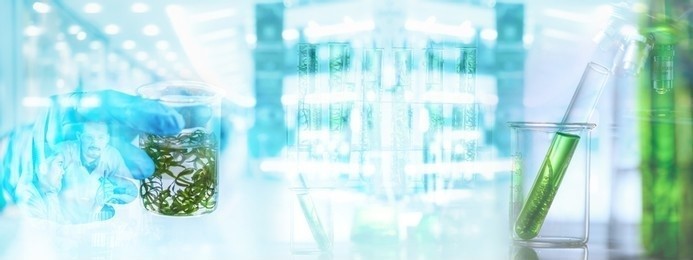Bioreactor Platform in Plant Tissue Culture
The vast variety and quantity of plants on the earth are valuable resources for human survival, and the organic matter from plant sources includes two major categories, primary and secondary metabolites. Primary metabolites are necessary for plant growth and development and are also important raw materials for the synthesis of secondary metabolites.
The use of secondary metabolites in plants dates back to ancient times, such as spices, food colorings, stimulants, drugs, sweeteners, etc. Until now these natural products still occupy an important place in human life, and 80% of the tens of thousands of natural substances known to people come from higher plants.

Lifeasible carries out micropropagation of target plants and production of useful secondary metabolites through a large-scale culture of plant tissues, which brings a new option to solve the problem of insufficient resources of wild plants. The development of new types of bioreactors suitable for different target plant tissue culture systems, in particular, is a key factor for us to achieve large-scale commercial production.
Bioreactors are one of the key factors to achieve large-scale factory production of plant cells and tissues, which have many advantages such as large working volume, high production capacity per unit volume, easy control of physical and chemical conditions, and ready-to-use scale production regardless of time and location, which open up a broad prospect for us to carry out the commercialization of plant tissue culture for production of natural products.
Different types of plant tissue culture reactors
| Types |
Features |
| Stirred reactor |
It can be used to control the process of plant tissue culture with the experience of microbial culture, and it has a wide range of operations, strong oxygen supply, good mixing effect, and wide adaptability, so it is widely used in large-scale production. |
| Pneumatic reactor |
The slow growth of plant cells and organs, with multiplication times of several days, requires a reactor that is well protected against contamination by trash bacteria. Therefore, Lifeasible can use pneumatic bioreactors for plant tissue culture, the advantages of which are its simple structure, low shear force, good mass transfer, low operating cost, and cost, in addition, it is easy to maintain aseptic operation for a long time because it has no stirring device. It can be used for plant cell and organ suspension and immobilization culture. |
| Immobilization reactor |
Lifeasible in plant cell immobilization generally adopts gel-embedded membrane fixation, grid and foam fixation, and surface adsorption, which reduces damage to cells by shear forces and facilitates the synthesis of secondary metabolites and the isolation of secreted metabolites. |
| Other types of reactors |
Lifeasible also uses a variety of new plant tissue culture systems such as multilayer ultrasonic internal circulation atomization bioreactors, rotary drum reactors, multilayer tower plate radial flow reactors, and periodic submersion reactors, depending on the unique characteristics of the plant. |
Project cases
Hairy root culture systems have shown unique advantages in terms of biomass increase, accumulation of medicinally active ingredients, and production stability, making the use of hairy root culture for the production of plant secondary metabolites a great production potential. Lifeasible uses plant tissue culture reactors to cultivate the hairy roots of medicinal plants not only to shorten their growth cycle but also to increase the production of secondary metabolites in the hairy roots.
In the design of the reactor, Lifeasible focused on the interrelationship between the reactor structure and the growth of trichome roots, and considered several factors such as oxygen transfer, mixing performance, and shear strength to improve the gas-liquid transfer rate and increase the dissolved oxygen while reducing the sheer force of the system so that the mixing performance of the reactor is good. And by improving the reactor system and culture process, the effect of hairy root mass on material transfer and oxygen transfer in the late growth stage was reduced.
You want to sign a confidentiality agreement.
You have a specific plant species for your experimental needs.
You have a reliable and relevant cooperation project to discuss.
You are very interested in our project or have any questions.
You need an updated and detailed quotation.
For research or industrial use.



